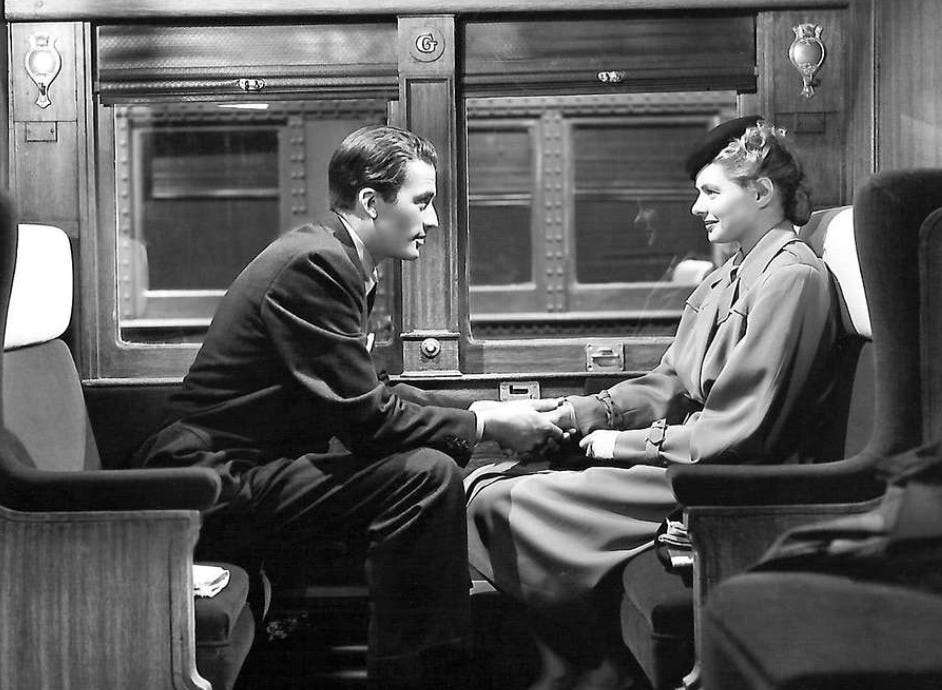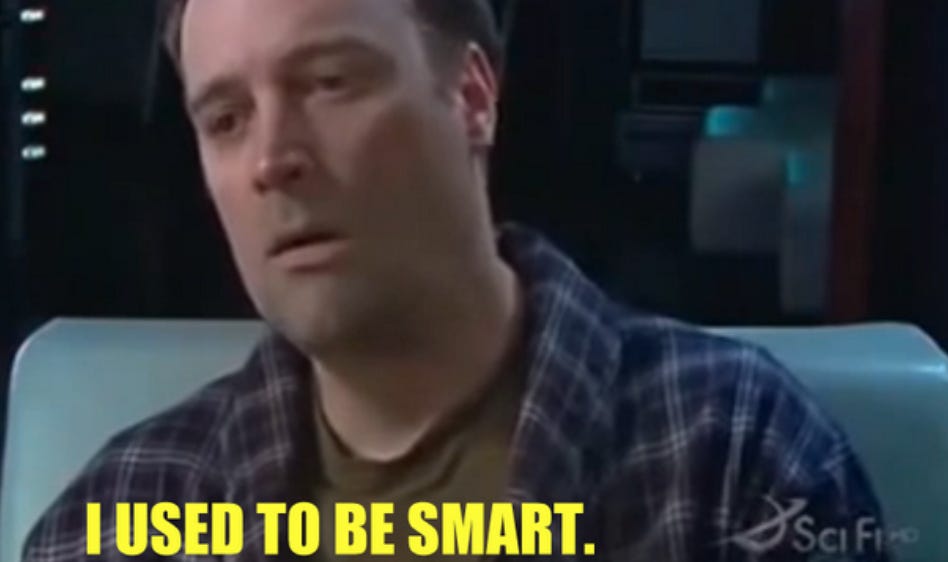On Laughter and Forgetting
The advantages of a poor memory
I used to have superb verbal recall. When I was in my twenties, one of my party tricks was that if you gave me a line from Hamlet, I could recite the next three lines. Now, I can’t even read my own poetry aloud without a printout to jog my memory.
In some ways, this is a blessing because it enables me to revisit books and films with almost the enthusiasm of a new reader. I read my way through Agatha Christie’s entire oeuvre in my twenties; now, thirty years on, I can reread most of them—with the unfortunate exception of her masterpiece, And Then There Were None—with unbroken suspense. I have completely forgotten who dun it. In another thirty years (if I live that long, Ahura Mazda willing), I will probably have forgotten the perp of And Then There Were None as well.
Occasionally, as I sit down, hoping to indulge in the intense pleasure of discovering a literary treasure that I’ve somehow happily failed to read, I feel a disquieting sense of déjà vu. Once, while I was living in London, I humble-bragged to friends that it was extraordinary that I hadn’t read Goethe’s Faust. The spine of the copy on my bookshelf looked disconcertingly wrinkled, but I put that down to having perhaps purchased it second-hand. But when I slid it out and opened it, I found every margin scribbled over with my tell-tale handwriting. Notable passages had been underlined with a wobbly hand and as I leafed through, a few old Post-It notes, faded from highlighter-pen yellow to narcissus yellow with age, fluttered out, having lost their adhesive a decade earlier. When I was an academic, the old joke went, “Read it? I haven’t even taught it”—a quip that shows that even Eng Lit professors aren’t immune to the impulse to pretend to be too cool for school, insouciantly winging it, rather than swotting away with the nerds. Personally, I always did read the books I taught. Though, as in the case with Faust, I am fully capable of both reading and teaching something and then completely forgetting it.
As the old saying popularly attributed to Maya Angelou has it, “people will forget what you said, people will forget what you did, but people will never forget how you made them feel.” This, for me, is true of books as much as of people. But sometimes, the feelings they arouse change on a rereading. I first read George Eliot’s epic society novel, Middlemarch, as an intense and earnest adolescent. When I picked it up again, I found that, while I rightly remembered the book’s emotional depth, Eliot’s humour had completely eluded me, as a stroppy teen with no sense of humour of my own at all. Similarly, I first read The Lord of the Rings, during the sexual awakening of puberty and intensely eroticised the relationship between Frodo and Sam. As the contemporary jargon has it, I shipped them. I was surprised on a later reading to find that the book is not simmering with barely repressed homosexual passion. (This probably says more about my teenage fantasies than you really need to know.)
In fact, I generally either forget—or worse, misremember—so much about the books I read that I should probably revisit most of them. Perhaps the most book-rich period of my life was my undergrad degree. I read, as we called it back then, Eng Lit, which involved devouring a series of classic works, in chronological order, “from Beowulf to the present day,” as the prospectus grandly announced. At this point, it feels like false advertising to say that I’ve been schooled in the best literature in the English language. I was schooled in it—but am I still, given how much I have forgotten? Perhaps, some like other certifications, degrees should have an expiry date. In an ideal world, we would go back to uni every ten years or so and repeat the curriculum.
For most of history, most literate people possessed only a small number of (highly prized) books. The Clerk (scholar) in Chaucer’s Canterbury Tales (1387–1400) had twenty tomes ranged on the shelf above his bed, a number of which he was proud. Books were meant to be returned to again and again, scrutinised for fresh meanings, scoured for daily inspiration in the way that religious texts still are for believers. Huge advances in printing technology, coupled with the end of pre-publication censorship and government monopolies on printing in the 1690s, significantly changed that situation. For the first time in history, people began to complain not only that some books were shoddy but that there were simply too many books, full stop. Books were no longer valuable items to be treated with reverence. As Lady Mary Wortley Montagu told Jonathan Swift in 1734, “I’m glad you’ll write; ’twill furnish paper when I shite.”
I am primarily an extensive reader—ranging freely, retaining little. And strangely, how enthralled I am with a book doesn’t always bear any relation to how long I am able to recall its contents. For about five years in the early 2000s, my leisure reading was almost exclusively popular science, especially evolutionary biology. Two books in particular stand out for the intensity of the pleasure they gave me: H2O: A Biography of Water by Philip Ball and Eating the Sun: How Plants Power the Planet by Oliver Morton. I vividly recall walking around for at least a week, in both cases, in a fervour of excitement at the astonishing inner workings and qualities of two mundane things: the water in my glass and the grass growing in Coram’s Fields, a five-minute stroll from our flat. I still remember vaguely that chlorophyll, like haemoglobin, is a ring-shaped molecule with a metal ion in its centre (magnesium in plants; iron in us). But I can tell you nothing more about how photosynthesis works. I remember only this impression of the layered quality of existence, of the secrets that lie hidden below the scale of human vision, like a teeming, bustling metropolis, concealed by high walls.
The first generations to live through the shift from intensive to extensive reading—from lovingly dogeared Bibles and works of the Classics to lending-library novels and flimsy newspapers read and discarded at coffee houses—battled the inadequacy of human memory with commonplace books, in which they would jot down their favourite quotations together with any striking thoughts that the books prompted. It must have been a comforting habit, giving you the sensation of making your book your own, weaving them into the tapestry of your mental world.
I do none of these things, but I clearly do have a strong nostalgia for personal cultural reference points. Like many people, I find these in science fiction. Sci fi and fantasy take place in alternative worlds and therefore their creators have to build those worlds from scratch and for a certain kind of person—and I’m definitely one such—the allure of those worlds is irresistible. Narnia is always there; you have only to open the wardrobe. As a child, I loved watching the series Mr Benn. Each episode begins with the protagonist entering the dressing room of a costume shop and trying on the outfit handed to him by a mysterious, twinkly-eyed shopkeeper. And each time, he opens the dressing room door to a new world that fits the outfit he’s now wearing. A cowboy’s stetson and spurs transport him to the Wild West; a chef’s whites take him to the kitchen of a queen; a spacesuit turns him into an astronaut. The clothes make the man. I recognise this format from the sci fi shows I love as an adult: Mr Benn is what sci fi aficionados call a Planet of the Week show.
I have my intensive reading texts, my Holy Books to which I always return: the works of Jane Austen and George Eliot, Shakespeare’s sonnets and even individual poems and short pieces of prose: “God's Grandeur”; “Ode on Melancholy”; “Of the Characters of Women”; Rasselas; The Left Hand of Darkness and perhaps most of all, “Loving in truth, and fain in verse my love to show.” These aren’t necessarily the works I feel are objectively the best. They aren’t even works associated with any particular moment in my life. But they are works that have become an integral part of my mental furniture, creaky old rattan chairs, armrests shiny with use, seats gently indented with the imprint of my bum.
But above all, it’s sci fi that I turn to when I want to revisit, rather than discover. Shows like Star Trek: Deep Space Nine and Babylon 5 are my intensive reading, my Bibles. I’ve been through multiple full rewatches and have watched certain specific episodes again and again. In real life, while I won’t pass up a chance to travel or to see old friends who live abroad, I’m not aching with wanderlust. If some all-powerful being planted invisible force fields around Sydney, attuned to my personal DNA, and I knew I could never leave this city again, I would not be unhappy. Perhaps that's because I want to go further than anywhere this world has to offer.
But the longer I continue writing this essay, the more familiar these arguments are beginning to sound. That old uncomfortable déjà vu is creeping up on me again. I’m sure I’ve made these points before, I’ve used this imagery, these examples before. I’m looking forward to my friends growing old, so that I can tell them my rambling anecdotes a dozen times and recycle ancient jokes, taking full advantage of the amnesia brought on by senility. But in the meantime, I’d better stop here, since I may have said everything in this essay once—may even more than once—already. If so, it’s been a pleasure to say it again. My poor memory takes the tedium out of repetition for me. That’s the joy of forgetting.




I was astonished and disconcerted to discover a couple of years ago that I’d forgotten not just plots but memorable characters in the novels of Trollope, all 50 of which I’d devoured in my 30s and 40s. I started rereading them chronologically and it was quite a revelation of how little I’d retained. I can’t tell you how relieved I am to know that you suffer from the same affliction, Iona! But as we continue to age, this extends beyond literature to people and events of all kinds. As I’ve been mulling sadly over the constantly increasing evidence of my memory loss, I’ve tried to make peace with it by reminding myself that the human brain didn’t evolve to retain the vast amounts of information and diversity of experiences that modern life entails. Most people throughout history spent their short lives within a few miles of where they were born and amongst the same small group of other people. No books, much less tv and films and the internet and world travel on airplanes. Our modern psyches are overloaded with stimuli and data, and perhaps what we mourn as the loss of precious mental furniture is just nature’s way of freeing our minds from what has become unnecessary clutter so we can focus more fully on the present. True or not, it’s a comforting thought.
As one who has never had good recall, I admire that ability. Lord of the Rings was my getaway growing up, reading it through 4 times, enough for even this poor recall to start picking up some elvish. To add to "water" and "plants," I highly recommend Topsoil and Civilization (Tom Dale and Vernon Carter) and Dirt: The Erosion of Civilizations (Montgomery).